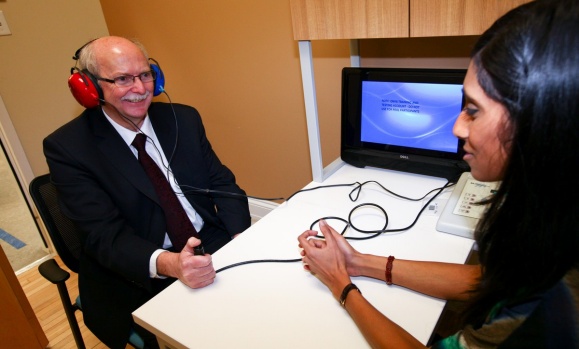Media Releases
» Go to news mainInvestment in Canadian knowledge of aging renewed

Halifax, NS (March 9, 2015) - A major study that will provide in-depth understanding of aging has received a shot in the arm. The Canadian Longitudinal Study on Aging (CLSA) has been awarded a $41.6 million grant from the Canadian Institutes of Health Research (CIHR) to continue its work for the next five years.
The most comprehensive study of aging ever undertaken in Canada began in 2010. It’s led by researchers at Dalhousie, McMaster, and McGill universities. Dr. Susan Kirkland of Dalhousie Medical School’s Department of Community Health and Epidemiology is one of three principal investigators.
“This is a landmark study that will contribute to our understanding of the aging process,” says Dr. Kirkland. “It will provide information on the ways in which we can address health outcomes that matter to people – such as maintaining quality of life and independence – as well as contribute evidence that can be used to make improvements to the health care system to meet the needs of this growing population.”
A total of 50,000 Canadians – including 4,500 Nova Scotians – are being followed over 20 years. The CLSA collects information on the changing biological, medical, psychological, social, environmental, and economic aspects of people’s lives as they get older.
Halifax-based CLSA participant Annette Leonard says that the CLSA has long-term benefits for Canadians as they age.
“I consider it my social responsibility to be part of this important study,” says Leonard. “In doing so, I know the data collected will benefit my grandchild and future generations.”
So far, hour-long telephone interviews have been completed with more than 21,000 individuals, aged 45 to 85, who were randomly selected from across Canada. An additional 26,000 people have taken part in extensive home-based interviews, and have visited one of the 11 data collection sites to undergo a range of physical tests. Hearing, heart function, bone density, mobility, and many other measures related to overall health are being collected by the CLSA team. The final participants required to reach the 50,000 mark are now being recruited.
The CLSA has operations in several Canadian cities. Dalhousie University hosts a data collection site and a computer-assisted telephone interviewing centre that interviews people across the country.
The National Coordinating Centre and the Biorepository and Bioanalysis Centre are based at McMaster University. The Statistical Analysis Centre is at McGill University, and the Genetics and Epigenetics Centre is located at the University of British Columbia.
A key feature of the CLSA is that its data is available to be used by researchers from many disciplines. Data from more than 21,000 participants who took part in telephone interviews are now available. Already, researchers have made requests for data to further research on topics such as caregiving, hearing loss, neurological conditions, injuries, and the health of older veterans.
The CLSA was launched through $50 million in grants. Funders include CIHR, the Canada Foundation for Innovation, provinces and universities – including the Nova Scotia Research and Innovation Trust and Dalhousie University – as well as other partners.
To learn more about the CLSA, visit www.clsa-elcv.ca.
-30-
Facts about the CLSA
- More than 160 researchers from 26 Canadian universities are involved in the study, including experts in biology, genetics, clinical research, social sciences, economics, epidemiology and population health.
- Eleven data collection sites, four computer-assisted telephone interview sites, and four centres involved in the collection and storage of data employ more than 250 people across the country.
- A total of 21,241 hour-long telephone interviews have been completed, and most of the data generated through the interviews are now available for researchers to apply to use.
- A total of 26,115 other people have taken part in the more extensive in-home interviews and visited a data collection site to provide blood and urine samples and to undergo a range of other physical and health measures.
- The final participants needed to reach the goal of 30,000 people for in-home interviews and data collection are now being recruited.
- 95% of participants who have finished their first interviews and been contacted for follow-up have remained in the study.
Media Contacts
Allison Gerrard
Media Relations, Dalhousie Medical School
(902) 494-1789
allison.gerrard@dal.ca
Sue Johnston
Communications Manager
Canadian Longitudinal Study on Aging
McMaster University
(905) 525-9140, ext. 21413
sjohnst@mcmaster.ca
Recent News
- Media release: Unlocking the genetic clues behind OCD: largest study of its kind uncovers specific genetic links to the mental health condition, making it clearer who may be at greater risk of developing it
- Media Opportunity: How Dalhousie’s nursing faculty are transforming health through research and practice
- Media release: Costly catch ‑ Free‑floating tuna fishing devices are harming ocean life at a global scale
- Media Release: Michelle Wang Named Dalhousie’s Sixth McCall MacBain Scholar
- Media Release: Dalhousie University recognizes three individuals with honorary degrees
- Media release: Available supports fall short for women facing homelessness and violence during pandemic, renewing calls for greater collaboration: Dalhousie University and Unity Health Toronto research study
- Media opportunity: Dalhousie University finds a genetic test can predict a person's probability of developing depression or bipolar disorder
- Media opportunity: Protein linked to severe asthma may bolster immune response and help protect against respiratory viruses like COVID, RSV: Dalhousie University research
